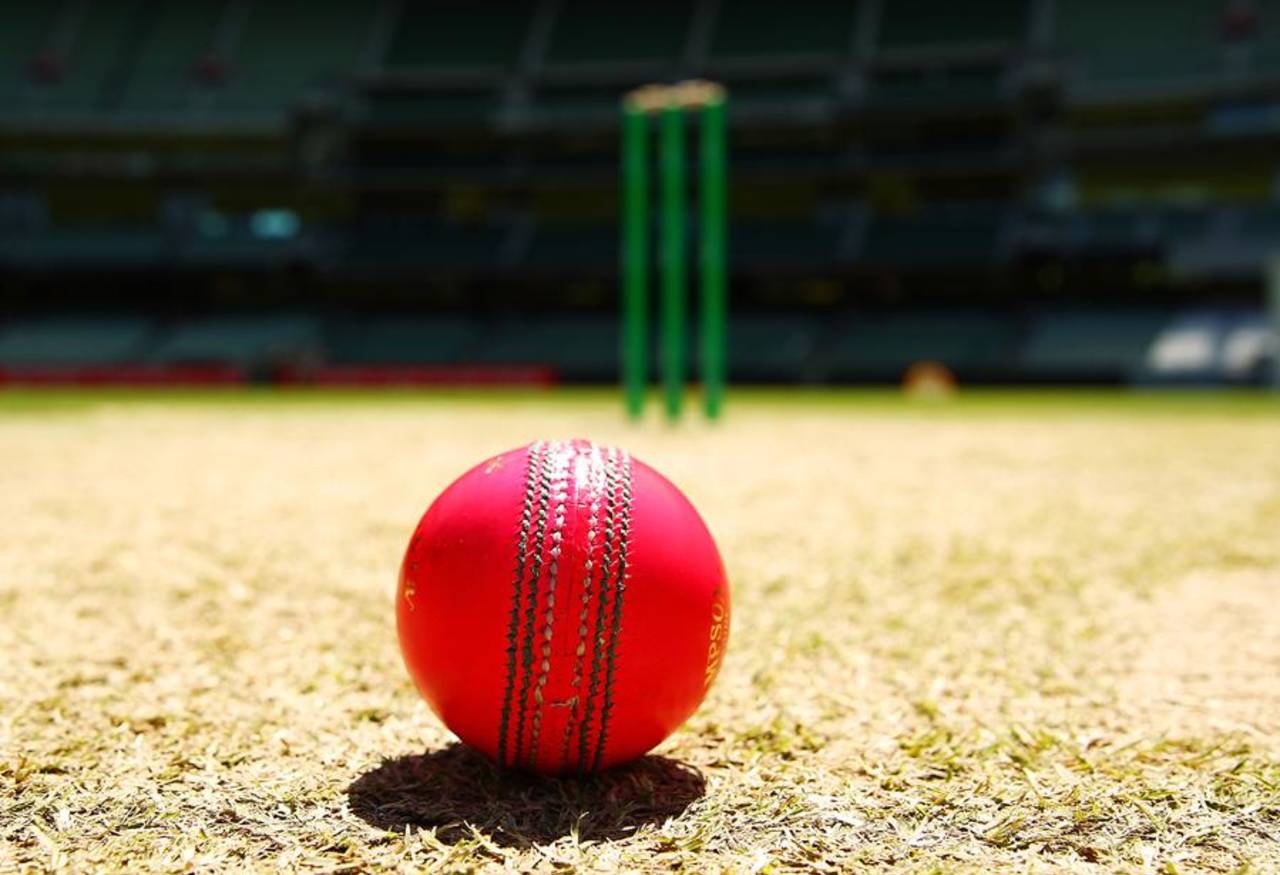Time for complaints against pink ball over, suggests Sutherland
Cricket Australia's James Sutherland had declared the testing phase with the pink ball is already over, in reply to player criticisms of it
Daniel Brettig
29-Oct-2015

The visibility of the pink ball and its durability on an abrasive pitches are the major concerns raised by players • Getty Images
If James Sutherland didn't quite say "mission accomplished", Cricket Australia's chief executive went mighty close. In responding to player critiques of the pink ball to be used in the inaugural day-night Test match between Australia and New Zealand in Adelaide next month, Sutherland declared the testing phase was over, with the current Sheffield Shield round played purely by way of preparation.
Players including Mitchell Starc, Adam Voges, Josh Hazlewood and most recently John Hastings have all raised a variety of concerns about the ball, from the difficulty of seeing it at times to an apparent lack of durability that leads to passages of drab cricket when the ball is not swinging. Sutherland, though, said he had stopped worrying about such opinions a month out from the Test itself.
"I was more concerned about criticism a couple of years ago when we were testing," Sutherland said following CA's AGM in Melbourne. "We're in high performance preparation mode now, the trials are gone, they happened a long time ago. Right now these matches being played are about making sure our Test players have an opportunity to play under these conditions quite close to the third Test match of the summer.
"That's the thing here, we've been through a really rigorous process in conjunction with particularly Kookaburra, and as Brett Elliott said earlier this week more work has gone into preparing this pink ball than any ball in the history of the game. We haven't learned anything new over the course of the last week or so that we didn't know already. Having had a look at photos of the ball yesterday in Adelaide, I'm even more positive and comfortable than I was."
As for the view of the Australian Cricketers Association president Greg Dyer that it is not too late to reschedule the match as a day game if the players were too sceptical, Sutherland was firm, also observing that New Zealand's cricketers seem to have accepted the circumstances ahead of them more readily than Australia's.
"Those comments were a bit late," he said of Dyer. "The trials were conducted over the course of the previous couple of seasons and the ACA were an absolutely integral part of that process, particularly Graham Manou, who worked very closely with Sean Cary at CA and Kookaburra. We're really comfortable with where the ball's at.
"The players are going into a bit of the unknown and these guys are elite athletes who are always challenged in a highly competitive environment. So you can understand form that perspective there's a bit of trepidation, but at the same time it's important they know and understand that it's happening. They do know that but it seems the New Zealanders have accepted that a bit [better] and perhaps our players just need to focus on what's ahead."
Some, including Hastings, have suggested that the pink ball would fare better if a new ball was taken earlier than the conventional 80-over mark, but Sutherland said that the playing conditions for the Test were already set. The ICC's cricket operations chief Geoff Allardice will be one of many interested observers in Adelaide next month, with potential tweaks to the laws following after the game plays out.
"The rules for Test cricket this summer are already there so nothing will change," Sutherland said. "John Hastings' comments are a reflection on a match played here at the MCG perhaps... Those things may develop down the track, but we know the playing conditions for this Test match and we're confident it will be a very good and fair contest between both teams."
While declining to offer specific figures, CA have commented that ticket sales for the Adelaide Test are at "Ashes levels", and Sutherland expressed his desire to see the match serve as proof to the rest of the world that floodlit Test matches could help to bring major growth to a format of the game that is healthy in Australia but moribund elsewhere.
"If demand for tickets are any indication, it's already a success, but let's see how it goes," he said. "We want to get the game up and going, we want to see great crowds, great atmosphere and a good contest between the two teams. We'll make some judgements on that, but part of this is a proof of concept that will hopefully benefit cricket all round the world.
"Not for one moment are we saying we want to play day-night cricket all the time that we play Test cricket, at certain times of year in certain parts of the world it is appropriate to play day-night Test cricket because you can capture greater audiences. When people work and kids are at school, it's an opportunity for more fans to have access to the game."
Daniel Brettig is an assistant editor at ESPNcricinfo. @danbrettig